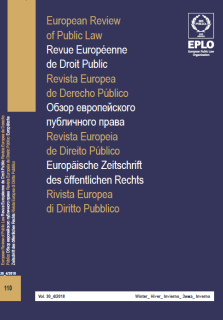
Constitutional Law / Droit constitutionnel
2018
Hungary / Hongrie
Dr. jur., Ph.D. candidate at the University of Szeged, Faculty of Law and Political Sciences,
Department of Constitutional Law
Dr. jur., Ph.D., assistant professor at the University of Szeged, Faculty of Law and Political Sciences,
Department of Constitutional Law (senior lecturer in Constitutional Law)
2018 was another eventful year for the Hungarian constitutional system. On April 8, 2018, general elections were held and one of the first major steps of the newly formed National Assembly was to accept the Seventh Amendment (hereinafter: Amendment) of the Hungarian Fundamental Law (hereinafter: FL). The Amendment contains a number of provisions that can be interpreted in response to today’s European challenges for Hungary, including the debate about the protection of constitutional identity or the amendment of the EU integration clause under Article E) of the FL, based on the most recent jurisprudence of the Hungarian Constitutional Court. Regarding organizational issues, the Amendment also creates a separate administrative jurisdiction in Hungary by establishing separate administrative courts and the Administrative Supreme Court is placed on top of the separate jurisdiction. Based on the Amendment, a number of high-priority acts - most importantly Act LV of 2018 on the right of assembly and Act LIII of 2018 on the protection of privacy - have been adopted.
L’année 2018 a été une autre année riche en événements pour le système constitutionnel hongrois. Le 8 avril 2018, des élections générales ont eu lieu et une des premières étapes importantes de la nouvelle Assemblée nationale a été d’accepter le Septième Amendement (ci-après: Amendement) de la Loi fondamentale hongroise (ci-après: LF). L’Amendement contient un certain nombre de dispositions qui peuvent être interprétées comme répondant aux défis européens actuels pour l’Hongrie, y compris le débat sur la protection de l’identité constitutionnelle ou la modification de la clause d’intégration européenne sous l’article E) de la LF, fondée sur la jurisprudence la plus récente de la Cour constitutionnelle hongroise. En matière d’organisation, l’Amendement crée aussi une juridiction administrative distincte en Hongrie en établissant des tribunaux administratifs distincts et la Cour suprême administrative est placée au-dessus de la juridiction distincte. Sur la base de l’Amendement, un certain nombre de lois hautement prioritaires - et surtout la Loi LV de 2018 relative au droit de la réunion et la Loi LIII de 2018 relative à la protection de la vie privée - ont été adoptées.





















